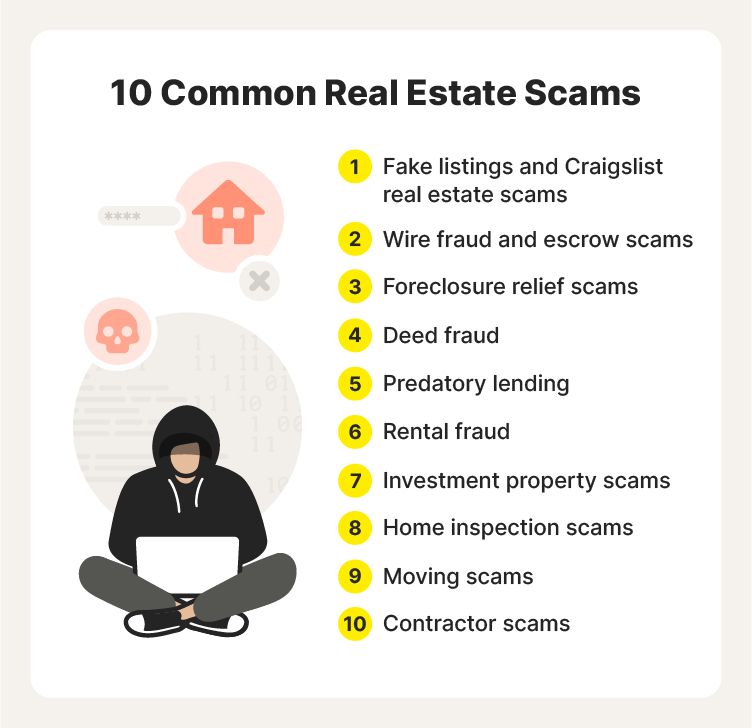

Buying or renting a new home can be stressful. From filling out applications to finding a moving company, there's a lot to manage, even without worrying about real estate scams. LifeLock Ultimate Plus helps give you the identity theft protection you need so you can focus on finding the home you want.
In 2022 alone, the FBI received 11,727 real estate fraud complaints that cost people almost $400 million in total. If you don’t want to be one of those people, keep reading to learn more about some common real estate scams and how to avoid them.
While no two scams are identical, they tend to follow the same basic formulas. With a little knowledge, you can spot housing scams before you lose time or money. Let’s take a look at ten common kinds of real estate fraud.
To create fake listings, scammers craft property ads that feature properties at unrealistically low prices. They’ll use stolen photos and descriptions from legitimate posts to create listings that look real. When a potential buyer contacts the scammer, they’ll request personal information or upfront payments before disappearing with your money.
Craigslist is a popular site for digital real estate scams because of how many people use it and because there is little oversight. Scammers on Craigslist create fake listings and use bait-and-switch tactics to show a nice property before presenting a different (usually run-down) property.
Escrow arrangements are attractive targets for scammers. They might call, send you an email, or text you, claiming that they represent your title or escrow company. They’ll ask you to send the money you need to open your escrow account to a bank account they created. When you do this, they’ll take your money and disappear.
It can be easy to fall for these wire transfer scams, especially during the hectic days of closing a mortgage loan and buying a home. Scammers create email addresses or phone numbers that look almost identical to those used by your legitimate title or escrow company.
In a foreclosure relief scam, con artists contact homeowners whose lender may have begun foreclosure proceedings on the home. The scammer promises the owners that they can help them save their home and reduce the homeowners' monthly mortgage payments to a level that they can afford. They'll even point owners toward websites that look legitimate.
These scammers will often request an upfront payment for their services. And if you pay, they'll take your money and disappear.
How to avoid these scams:
Deed fraud is when someone steals your identity, forges your name on a deed, and tries to commit home title theft. What’s really scary is that you might not discover this type of fraud until you try to sell your home.
Vacation homes, abandoned homes, or unoccupied homes are often the targets of deed fraud, but scammers sometimes target occupied homes, too. If you’ve fallen victim to deed fraud, you might receive a notice for an unpaid water bill, tax bill, mortgage bill, or foreclosure notice on a property you don’t own or occupy.
How to watch out for these scams:
Predatory lenders prey on borrowers who don’t have good credit scores, typically charging them sky-high interest rates on mortgage loans. These high rates can leave borrowers with monthly payments they can't afford.
Homeowners then run the risk of losing their homes to foreclosure if they start missing payments—while the predatory lenders happily collect the profits from those higher interest rates.
How to avoid these scams:
In a rental scam, scammers create fake rental properties on listing sites using photos and descriptions of a real home. They ask you to send a security deposit and their first month's rent through an electronic transfer and an application.
The listing says they won't show the apartment or rental property until they receive this deposit, promising to refund the money if you don't rent the home. But if you send money, the scammers take it and disappear.
How to avoid these scams:
Investing in property can be a good idea, and having a steady source of passive income from an investment property can be hard to pass up.
Investment property scams take several forms, including:
How to avoid these scams:
An important part of buying a home is having it inspected. An inspector will look for problems to provide you with a better picture of what you’re buying (and can potentially help you save on the purchase price).
But not all home inspectors have your best interests in mind. Some work with sellers to provide inspections that gloss over major problems, while others don’t have the skills or experience needed to make an accurate appraisal. This can leave you with a house with many problems that cost a lot of money to fix.
How to avoid these scams:
When you move, your moving company will provide an estimate of how much they'll charge to move your belongings. They might also require you to pay a deposit upfront. But moving fraud typically happens once the movers drive up to your new home. They’ll demand a higher price to unload your belongings, and if you don't pay up, they threaten to leave with your items still in their truck.
If you do encounter moving fraud, be sure to file a complaint. You can file one with the Federal Motor Carrier Safety Administration if the fraud occurs across state lines. If the fraud occurs with an in-state move, file a complaint with your state agency, which you can find here.
How to avoid these scams:
Most states require contractors to be licensed and insured for a reason—it’s a very difficult job that can have a tremendous impact on a homeowner’s finances and safety.
Scams involving contractors can take many forms. They may overcharge for work, go back on an estimate, do poor work, or they may not do any work after taking a substantial deposit from you. You should also avoid contractors going door to door. The most successful contractors are so busy that they don’t need to be in your neighborhood looking for work.
How to avoid these scams:

While you might not be able to avoid all scammers, you can avoid getting scammed by following simple guidelines. The tips below can help you determine what questions you should be asking and how to spot red flags.
Buying a home is the biggest investment the average person makes in their lifetime. Because you’re committing to something that will last for decades, finding the right people and businesses to help you along the way is important.
Choosing the right group of professionals can enormously impact how smoothly the process goes, and they can help you save money and find the home of your dreams.
Professionals in the real estate industry don’t ask for cash payments. Nor do they ask you to pay in cryptocurrency or gift cards. You will do most transactions through wire transfers, credit or debit cards, or by check. This is for their protection as much as yours because it creates a paper trail.
Scammers will often ask you to do things in ways that are tough to trace. Be careful about paying in cash or cryptocurrency or falling victim to a Zelle scam. These payment methods are more difficult to trace, making them perfect for criminals who want to take your money and run.
Real estate transactions, whether you’re buying a home or renting a condo, can feel borderline invasive because of the depth and breadth of the personal information that you’re required to provide. During a real estate deal, you’ll probably be sharing your:
Because so much of your personally identifiable information will be changing hands, it’s important to understand who will have access to it and why they need it. If you don’t feel comfortable sharing your information, ask how the other party will keep it safe and what kind of safeguards (like the types of encryption they use) are in place to protect your identity and finances.
Never feel bad about double-checking where your data is sent or confirming a legitimate request. Taking a small step to protect yourself from identity theft is always worth it.
The process of buying and selling homes is heavily regulated because of the number of fees and the amount of money involved. Because of this, real estate businesses either aren’t legally allowed to charge upfront or last-minute fees or don’t need to do so because of how the system is set up.
If a company is trying to charge you before they review your rental application or try to tack on a bunch of fees before closing, it might mean it’s a scam. If you aren’t sure about a fee, check the contracts you signed when the process began.